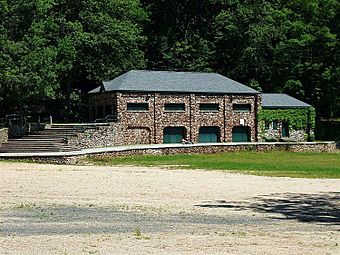Rockwell Park facts for kids
Quick facts for kids |
|
|
Rockwell Park
|
|
 |
|
| Location | Dutton Ave. and Jacobs St., Bristol, Connecticut |
|---|---|
| Area | 104 acres (42 ha) |
| Built | 1914 |
| Architect | Sheffield Arnold |
| NRHP reference No. | 87000788 |
| Added to NRHP | May 21, 1987 |
Rockwell Park is a super cool public park located in Bristol, Connecticut. You can find it in a neighborhood west of downtown Bristol. This park has open grassy areas and thick woodlands. The Pequabuck River even flows right through it! Inside the park, you'll find a swimming pool, sports fields for games, and a fun playground. Many of the park's buildings are made from rustic cobblestone, and some are even unique "follies" – buildings built just for decoration. Rockwell Park was the very first public park in Bristol. It was added to the National Register of Historic Places in 1987 because of its special history.
Contents
Welcome to Rockwell Park!
Rockwell Park is a long, stretched-out park that covers about 104 acres (42 ha). It goes from Steele Road on one side all the way to Park Street and Terryville Road on the other. The Pequabuck River is a fast-moving stream that cuts through the middle part of the park.
What Does the Park Look Like?
The northern parts of the park are very hilly and covered in thick trees. These areas are mostly left wild, with only hiking trails for you to explore. The southern parts of the park are flatter. Here, you'll discover two man-made ponds, a big grassy area perfect for relaxing, and a group of sports fields and a playground. It's a great place for all kinds of outdoor fun!
Cool Buildings and Designs
The buildings and structures in Rockwell Park have a special look. They are built with rustic cobblestone. The three main entrances to the park each have gates made from cobblestone. The gate at Dutton Avenue is the most fancy one! The most impressive building is the Summerhouse. This is a pavilion with cool rounded arches and decorative tops called finials on its roof.
How Rockwell Park Started
The park was given to the city in 1914 by a generous person named Albert Rockwell. He owned a local company that made car parts and doorbells. Mr. Rockwell hired Sheffield Arnold, a landscape architect from Boston, Massachusetts, to design the park.
Rockwell Park was special because it had lots of fun things to do right from the start. This was different from older parks, which were mostly for carriage rides and quiet walks. The land for the park was originally part of the Rockwell family's own property. They first gave about 80 acres (32 ha), and then added more land over the years. The Rockwell family also regularly gave money to help maintain the park and add new features. Rockwell Park was the only public park in Bristol until 1933!
 | DeHart Hubbard |
 | Wilma Rudolph |
 | Jesse Owens |
 | Jackie Joyner-Kersee |
 | Major Taylor |



